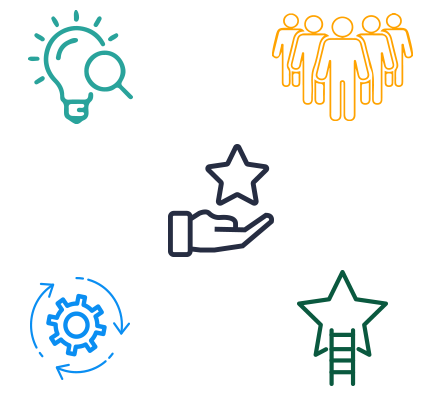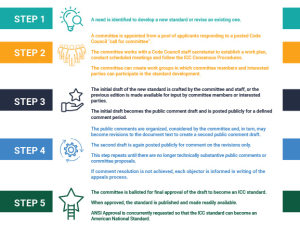Standards Development Process
The International Code Council adheres to openness and transparency in our Standards development process. All of our Standards committee meetings are open to the public. Any interested party can participate in committee meetings and be considered for committee membership.
Receiving accreditations from the Standards Council of Canada and the American National Standards Institute, help the Code Council aim to ensure consistency and fairness in the standard development process.
Primer on the Standards Development Process
View the Primer that provides information on the standards development process – specifically for stakeholders interested in getting involved in the Code Council’s standards activities. Also see this 5 minute that highlights the Code Council’s work in this important area.
Standards Development Policy, Procedures and Committee Application
Official ��ɫApp policies can be downloaded from ��ɫApp's Corporate Governance page.
- Click here to view ��ɫApp's ANSI Approved Consensus Procedures for developing standards.
- Click here to view ��ɫApp's SCC Accredited Consensus Procedures for Canadian standards development.
Please see the ��ɫApp Call for Committees page to access ��ɫApp's online committee application process.
Webinar: Industry Standard Advances
Feel free to visit ��ɫApp Learn Live periodically for webinars with a broad overview and explanation of the Code Council's codes and standards developing process. Below is a past webinar by Karl Aittaniemi, P.E., Director of Standards Development.
- (password: 4xEW5Hba)
Often Asked Questions
Very important. Standards are developed to ensure products, services and systems are safe, reliable and consistently perform the way they are intended to. They establish common values that define safety and quality requirements. ��ɫApp Standards are developed to address building industry challenges as they relate to compliance with the I-Codes Among ��ɫApp there are 56 other standards developing organizations that have standards referenced in the International Building Code alone.
Standards are good for industry and trade associations often note an improvement in business when standards are introduced. Participation is an opportunity to drive your particular industry.
The Code Council has written Consensus Procedures Approved by ANSI to outline the development of standards in the most time efficient manner. Development can include both existing standards on a 5-year revision cycle as well as brand new standards to address new challenges faced by the building industry. Participants are expected to be prepared to lend their experience and expertise in the creation of the technical content. Committee meetings and work groups created by the committee meet regularly until the new standard is published or the current edition is updated. Depending on the scope of the standard, a revision cycle can range from a few months to 2 years.
The I-Codes set minimum requirements but may not necessarily detail how to achieve those requirements. A consensus standard that is referenced in the I-Codes provides that means so long as it is written in mandatory language that can be enforceable. In other words, it can offer a path to compliance. A lack of regulatory documentation is a primary reason for the development of a standard to help authorities having jurisdiction.
Yes. The Code Council was Accredited by the Standards Council of Canada (SCC) in May of 2023 and can develop National Standards of Canada. Areas of focus will pertain to the built environment and especially accessibility as part of the Canadian Governmental mandate for accessible and useable building and facilities.
List of ��ɫApp Standards
The Code Council is very active in standards development. Many inquiries on the status of ��ɫApp Standards are routinely received by staff. Below is a current list of ANSI Approved ��ɫApp Standards. Also included are ��ɫApp Standards that are co-branded and/or co-developed with other ANSI Accredited SDOs. A great source for specific news on the standards under development is on the individual standard committee’s webpage. Also look for regular updates published in the ��ɫApp Building Safety Journal.
- ��ɫApp 300-2023 – Standard on Bleachers, Folding and Telescopic Seating, and Grandstands (IS-BLE)
- ��ɫApp 400-2022 – Standard on the Design and Construction of Log Structures (IS-LOG)
- ��ɫApp/NSSA 500-2023 – Standard for the Design and Construction of Storm Shelters (IS-STM)
- ��ɫApp 600-2020 – Standard for Residential Construction in High Wind Regions (MHRRC)
- ��ɫApp 700-2020 – National Green Building Standard
- ASABE/��ɫApp 802-2020 – Landscape Irrigation Sprinkler and Emitter Standard (IS-IEDC)
- CSA B805/��ɫApp 805-2022 – Rainwater Harvesting Systems (IS-RCSDI)
- ��ɫApp 900/SRCC 300-2020 – Solar Thermal System Standard (IS-STSC)
- ��ɫApp 901/SRCC 100-2020 – Solar Thermal Collector Standard (IS-STSC)
- ��ɫApp 902/PHTA 902/SRCC 400-2020 – Solar Pool and Spa Heating System Standard (IS-STSC)
- ��ɫApp 903/SRCC 500-2024 – Solar Hot Water Storage Tank Standard (IS-STSC)
- ��ɫApp 1100-2019 – Standard for Spray-Applied Polyurethane Foam Plastic Insulation (IS-FPI)
- ��ɫApp/MBI 1200-2021 – Standard for Off-site Construction: Planning, Design, Fabrication and Assembly (IS-OSMC)
- ��ɫApp/MBI 1205-2021 – Standard for Off-site Construction: Inspection and Regulatory Compliance (IS-OSMC)
- ��ɫApp/MBI 1210-2023 – Standard for Mechanical, Electrical, Plumbing Systems, Energy Efficiency and Water Conservation in Off-site Construction (IS-OSMC)(IS-OSMEP)
- ��ɫApp 1300-2024 – Standard for the Vulnerability-Based Seismic Assessment and Retrofit of One- and Two-Family Dwellings (IS-RSARC)
- ��ɫApp A117.1-2017 – Accessible and Useable Buildings and Facilities (��ɫApp(AS A117))
- RESNET/��ɫApp 301 – Standard for the Calculation and Labeling of the Energy Performance of Low-Rise Residential Buildings Using an Energy Rating Index
- RESNET/ACCA/��ɫApp 310 – Standard for Grading the Installation of HVAC Systems
- RESNET/��ɫApp 380 – Standard for Testing Airtightness of Building Enclosures, Airtightness of Heating and Cooling Air Distribution Systems, and Airflow of Mechanical Ventilation Systems
- RESNET/��ɫApp 850 – Standard Calculation and Labeling of the Water Use Performance of One- and Two- Family Dwellings Using the Water Rating Index
New Standards Under Development
With Intent for ANSI and/or SCC Approval
- ��ɫApp 605 – Standard for Residential Construction in Regions with Wildfire Hazard (IS-MHRRC)
- ��ɫApp 610 – Standard for Residential Construction in Regions with Seismic Hazard (IS-MHRRC)
- ��ɫApp 615 – Standard for Residential Construction in Regions with Tsunami Hazard (IS-MHRRC)
- ��ɫApp 815 – Standard for Sizing Water Distribution, Sanitary Drainage and Vent Piping Systems (IS-SWDDV)
- ��ɫApp 825 – Private Sewage Disposal Systems (IS-PSDS)
- ��ɫApp 1125 – Standard for Classification of Magnesium Oxide Boards in Building and Construction (IS-MGOB)
- ��ɫApp 1150 – Standard for 3D Automated Construction Technology for 3D Concrete Walls (IS-3DACT)
- ��ɫApp 1155 – Standard for Low-Carbon Alternative Cements used in Concrete (IS-LCCC)
- ��ɫApp/THIA 1215 – Design, Construction, Inspection, and Regulation of Tiny Houses for Permanent Occupancy (IS-OSMTH)
- ��ɫApp 1425 - Standard for Residential Smart Doors (IS-RSDC)
- ��ɫApp 1500 – Standard for Existing Building Safety Inspections (IS-EBSI)
- RESNET/��ɫApp 1450 – Remote Virtual Inspection for Energy and Water Performance in Buildings (IS-ERVI)
- ASHRAE/��ɫApp Standard 240 – Evaluating Greenhouse Gas (GHG) and Carbon Emissions in Building Design, Construction, and Operations (IS-CBC)
- ASC/��ɫApp A118 – Acoustics of the Built Environment (IS-ABEC)
Standards Development & Consensus Committees
Review information on the Code Council's Standards Committees and the development of ��ɫApp Standards, including development schedules, committee meeting minutes, Public Comments, Public Input Agendas, Committee Action Reports (CARs), draft documents, and committee lists. Please click button below.
Standards Errata
- Review errata for codes, standards and other products.
- Submit a new Errata.
SCC Accreditation
The International Code Council is the latest standards-developing organization (SDO) to receive accreditation from the . As a global leader in providing building safety solutions, the International Code Council joins a select group of organizations that contribute to the development of the National Standards of Canada for the benefit of Canadians. The work plan for future Canadian ��ɫApp Standards development projects can be found here.
Accréditation CCN
L’International Code Council a reçu l'accréditation du Conseil canadien des normes (CCN) en tant qu'organisme d'élaboration de normes (OEN). En tant que chef de file mondial en matière de solutions de sécurité pour les bâtiments, l'International Code Council se joint à un groupe sélect d'organismes qui contribuent à l'élaboration des Normes nationales du Canada dans l'intérêt des Canadiens. Le plan de travail des projets d'élaboration des normes canadiennes de l'��ɫApp est disponible ici.
ANSI Accreditation
The International Code Council is accredited by the as a standards developing organization that adheres to ANSI’s Essential Requirements for openness, balance, consensus and due process. Participation of the various stakeholders in an equitable, accessible and responsive environment is key in developing a consensus standard for recognition as an American National Standard.
The Code Council’s experience as a structured platform upon which consensus is achieved from industry stakeholder input places the Code Council in an ideal position as a standards developer. The Code Council also has the capability to augment the resources of other SDO’s seeking to develop standards for their respective industries. With the Code Council’s global membership representing more than 38 countries, its reach touches upon individuals experienced in facets peripheral to the building industry. In other words, the Code Council can develop ANSI-approved standards that go beyond building codes.
The Code Council's Consensus Procedures used to develop ��ɫApp Standards were ANSI Approved in August 2021. As a standards developing organization this current version provides the Code Council with a streamlined method to develop Standards in a most time efficient manner.
Have questions about the Standards Process?
Contact Karl Aittaniemi, P.E.
Director of Standards Development at kaittaniemi@iccsafe.org




